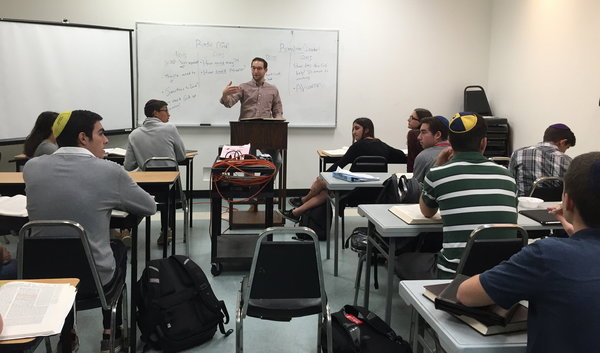Students sign up for extra Talmud, no grades involved

GEMARA: Rabbi Ari Schwarzberg teaches 10-12th graders during AGS, where students are learning Sanhedrin.
December 19, 2014
It’s 9:00 am at Shalhevet and juniors and seniors who’ve grabbed breakfast from the JCC kitchen are trickling in one by one to Berch B for the Advanced Gemara Shiur, or AGS.
The mood is cheerful and the banter will soon begin.
“It’s a great new course with no pressure over grades,” said junior Joe Schnitzer. “All students are there voluntarily so the whole attitude of the class is different… They all want to be there, and it’s great learning.”
AGS is an optional class which teaches a more advanced style of Gemara studies. It requires that students are at a certain skill level in terms of their Gemara studies, so the class can move at a fast rate without anyone being left behind.
Every student that applied was let in but some students were advised to not apply at all.
Ninth graders learn on Mondays, Wednesdays, and Fridays. They learn Masechet Sanhedrin. 10th-, 11th- and 12th-graders learn together in the same classroom on Tuesdays, Thursdays and Fridays learning the same subjects as one another. They learn the 8th perek of Masechet Sanhedrin.
Although the class is optional, students are still obligated to take a traditional Gemara class with the rest of their grade. That means AGS students often have Gemara twice a day.
“I had sensed over the years that some students had a thirst for learning Gemara at a higher level,” said Rabbi Ari Schwarzberg, who teaches AGS along with Reb Noam Weissman.
“That was one of the main motivations of the whole Judaic Studies faculty in coming together and create this program.”
As the class prepared to start that day, a female student came in and asked Rabbi Schwarzberg a shaila, or question. Her problem was that she hadn’t prayed yet and she wondered whether or not she should go to AGS or daven.
Rabbi Schwarzberg thought for a minute and left class to talk with Student Activities Director Raizie Weissman, who oversees the girls’ singing minyan. He came back in with an answer: she should daven after class.
As the class began, Rabbi Schwarzberg handed out a paper with of Gemara text.
“If you recognize this topic and can explain it, we don’t have to do it,” he said. “If you just recognize it without explaining it, we are doing it.”
Most of the class agreed that they had seen this topic before but couldn’t explain it.
From then on, the students seemed very involved and actively looking at and translating the text. One student was even seen pushing her phone far away from her, as if to focus more on the assignment at hand.
Students continued on this path, annotating and highlighting the text, making note of what the rabbi said – though they knew there would be no exam.
Senior Zev Marcus came into the class with a plate of bagels from his bagel delivery service, delivering the bagels to whoever had pre-ordered them.
Soon after that, sophomore Bennett Schnier entered the room wearing tefillin from the Main Minyan, and asked senior Mati Hurwitz if he could lein the week’s Torah portion.
“Every Jew should know this parsha,” said Mati. Assured by others in the room that someone in Main Minyan would be able to lein it, Bennett was on his way.
Rabbi Schwarzberg then directed the class to break up into to chavrutahs, which are pairs of learning partners. He gave them a tip on how to learn the Gemara before breaking them up to decipher the text. Students divided and read the Gemara out loud to their partners, and explained it between lines.
Everyone interviewed loved the class – though perhaps the timing could be better.
“It is a lot of work to have straight classes from 7:45 until lunch,” said freshman Ilan Bouskila.












